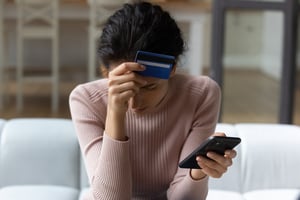 A Chapter 7 bankruptcy works as a quick reset button – all of your unsecured debt will be wiped out in approximately 3-4 months, from the date your case is filed. Unsecured debt includes credit card debt, medical bill debt, and personal loans. This sounds exciting, as it certainly provides you with a fresh new start. Instead of paying your credit card bills, you can simply wipe out the remaining debt you have. You can obtain a new credit card after you receive your bankruptcy discharge, and rebuild your credit score by using the credit card and paying it off every month.
A Chapter 7 bankruptcy works as a quick reset button – all of your unsecured debt will be wiped out in approximately 3-4 months, from the date your case is filed. Unsecured debt includes credit card debt, medical bill debt, and personal loans. This sounds exciting, as it certainly provides you with a fresh new start. Instead of paying your credit card bills, you can simply wipe out the remaining debt you have. You can obtain a new credit card after you receive your bankruptcy discharge, and rebuild your credit score by using the credit card and paying it off every month.
You may wonder if you can keep certain credit cards, keep making payments on them, and exclude them from your Chapter 7 bankruptcy. The answer is no, because all debts must be listed in the schedules when you are filing for bankruptcy. If you owe a creditor or a credit card company funds, that must be disclosed and listed in your bankruptcy. The reason why keeping a credit card and continuing to make payments on it will not likely work out in your bankruptcy, is because the trustee will likely demand that the creditor return that payment that you made to the creditor. The reason for this is, bankruptcy requires that there is a fair distribution of money to your creditors. If you choose to pay a certain creditor and not another creditor, in the bankruptcy world, you are favoring one creditor over another and these payments are called “preferential payments.” If preferential payments are made within 90 days of filing for bankruptcy, the trustee can potentially recover that money back by “clawing back” the preferential payment and redistributing that fund to your creditors to ensure that a fair distribution is made.
CALL NOW FOR A FREE STRATEGY SESSION FROM A MN BANKRUPTCY LAWYER AT LIFEBACK LAW FIRM
Moreover, creditors are quite sophisticated and creditors will discover that you have filed for bankruptcy and close your account anyway. Many large lending companies have an electronic information service that they use, which sends them an alert when a customer has filed for bankruptcy. Obtaining a new credit card after your receive your bankruptcy discharge is recommended. Often there is a fear that after filing for bankruptcy, you will have a harder time obtaining a new credit card; however, it is actually fairly easy to obtain a new credit card after receiving your discharge and credit card companies will extend credit to those who have filed for bankruptcy. To learn more about the process of disclosing all your creditors in a bankruptcy and how you can obtain a new credit card after you receive your bankruptcy discharge, you should consult with an experienced bankruptcy attorney. See us at LifeBackLaw.com!


